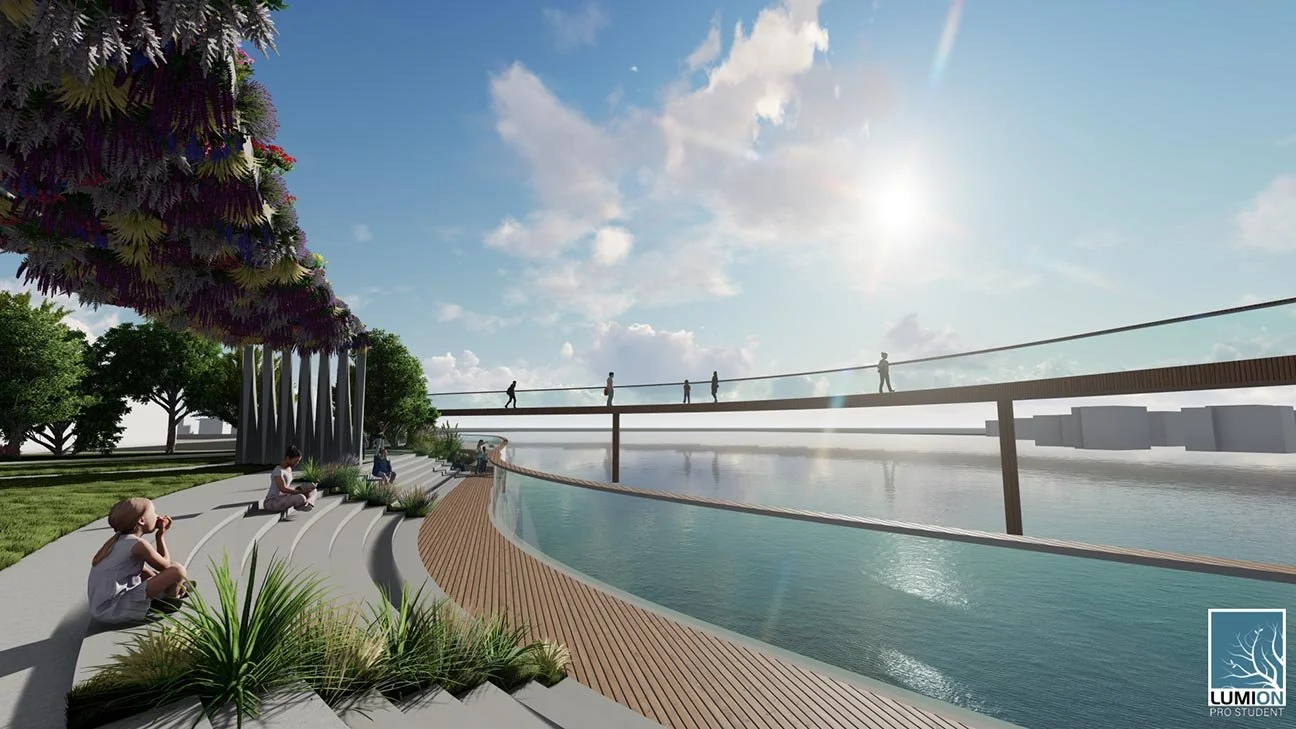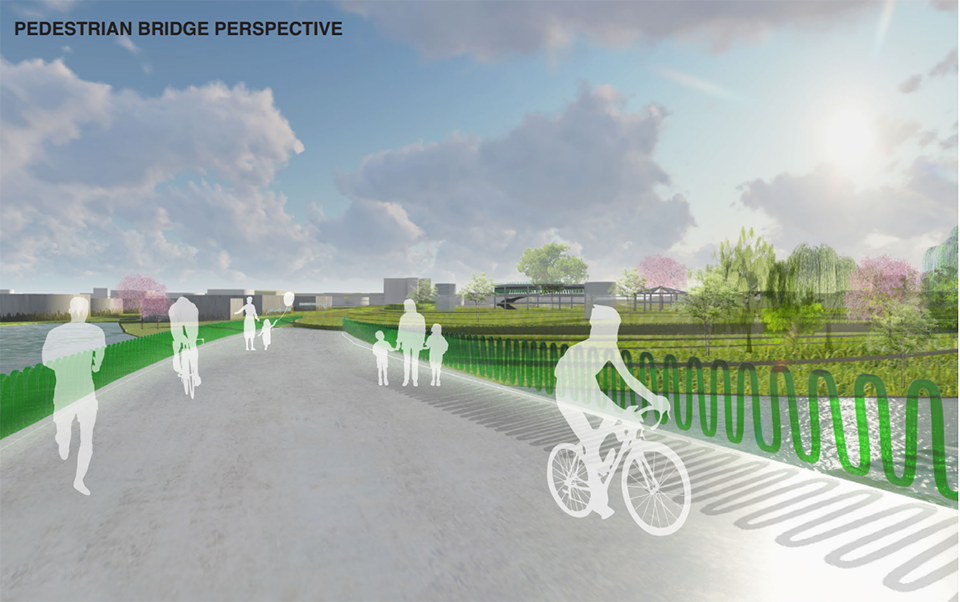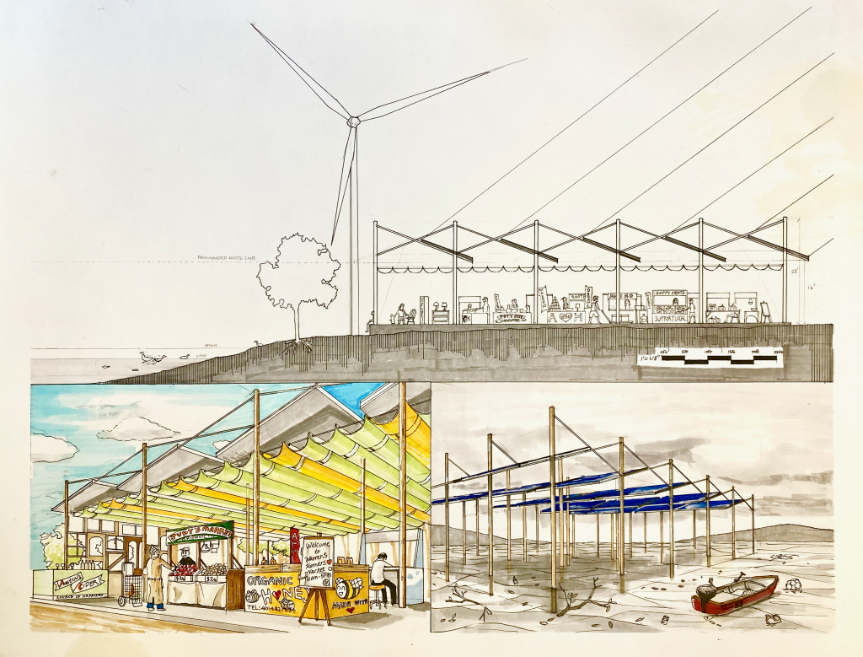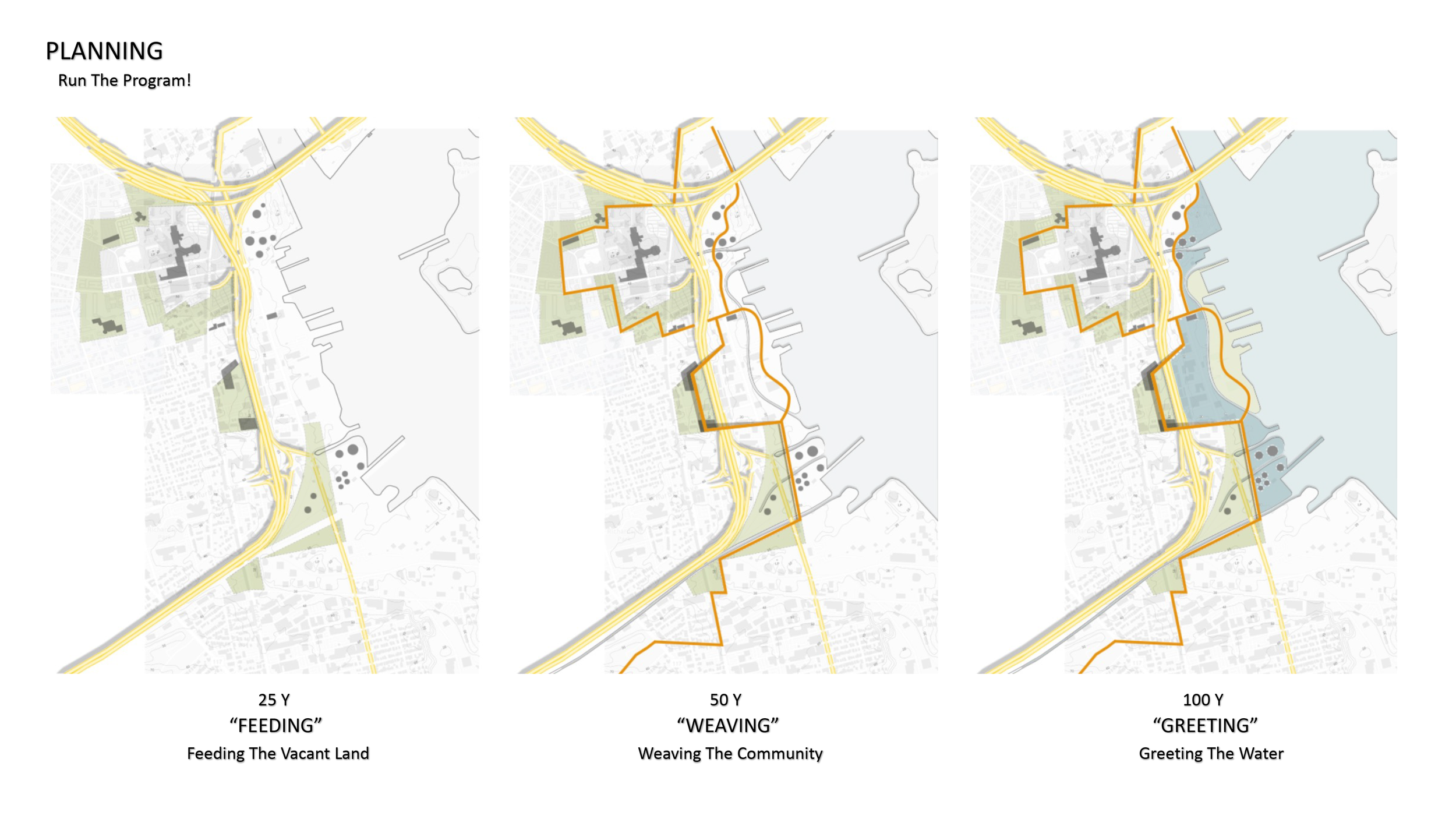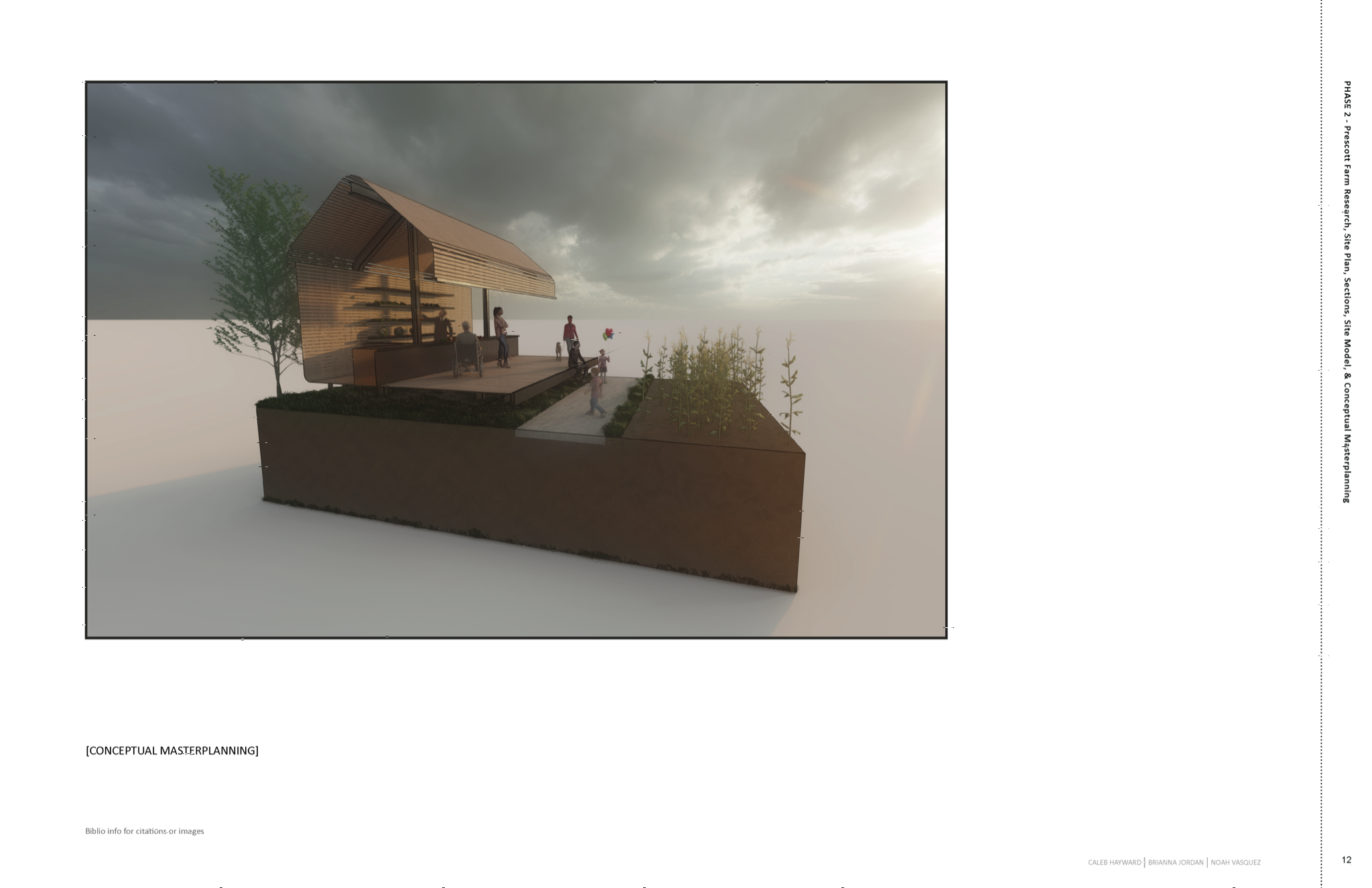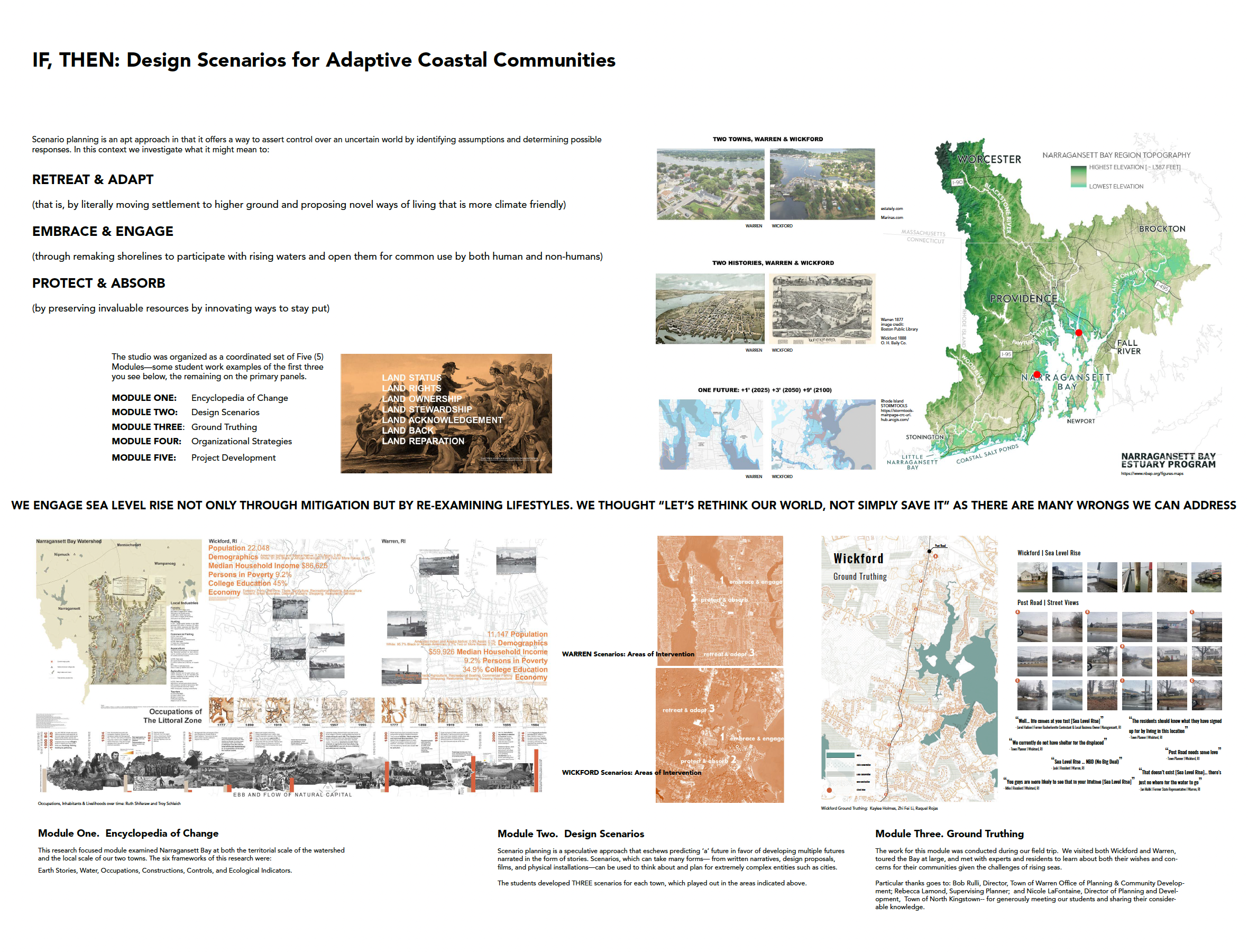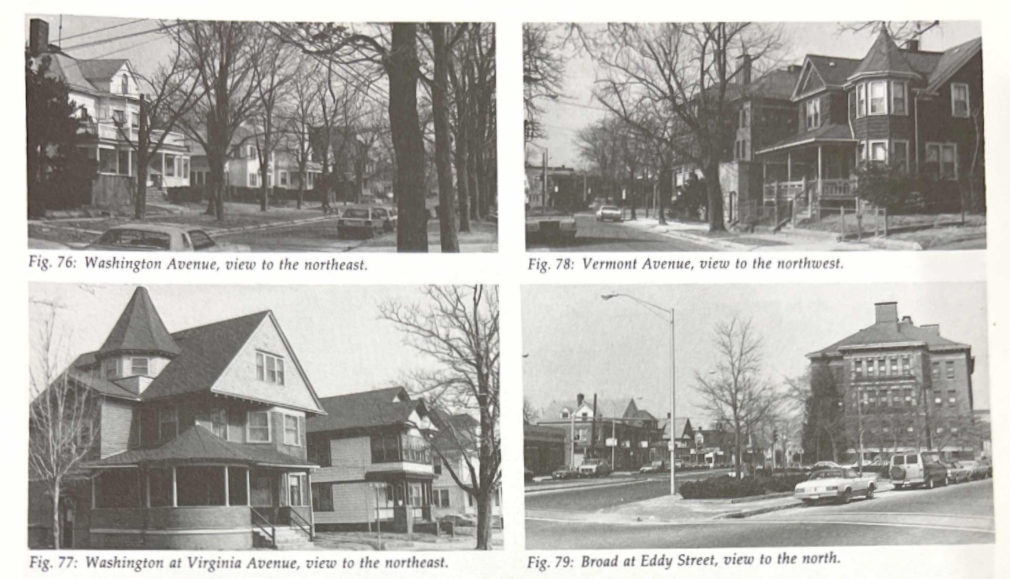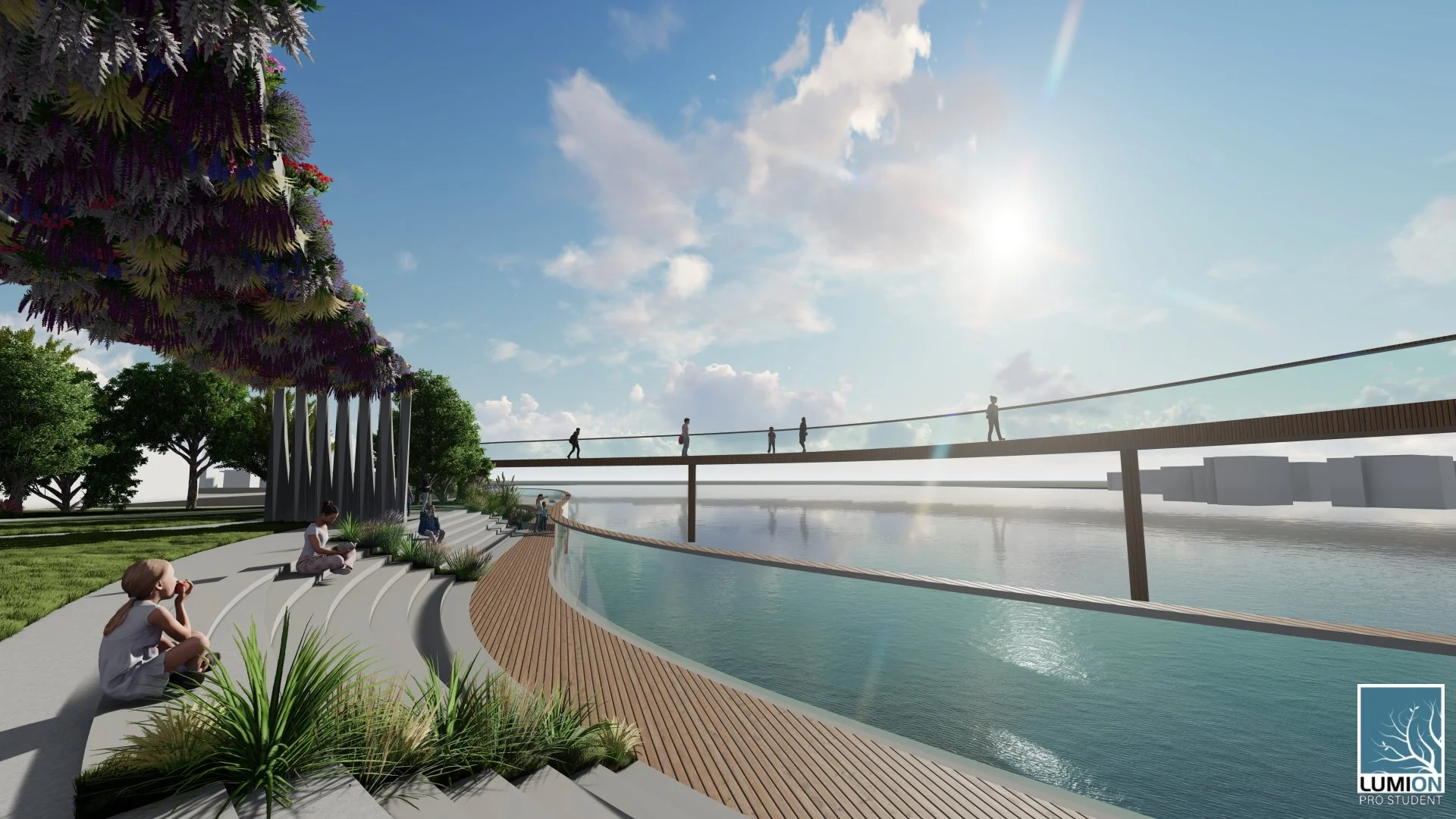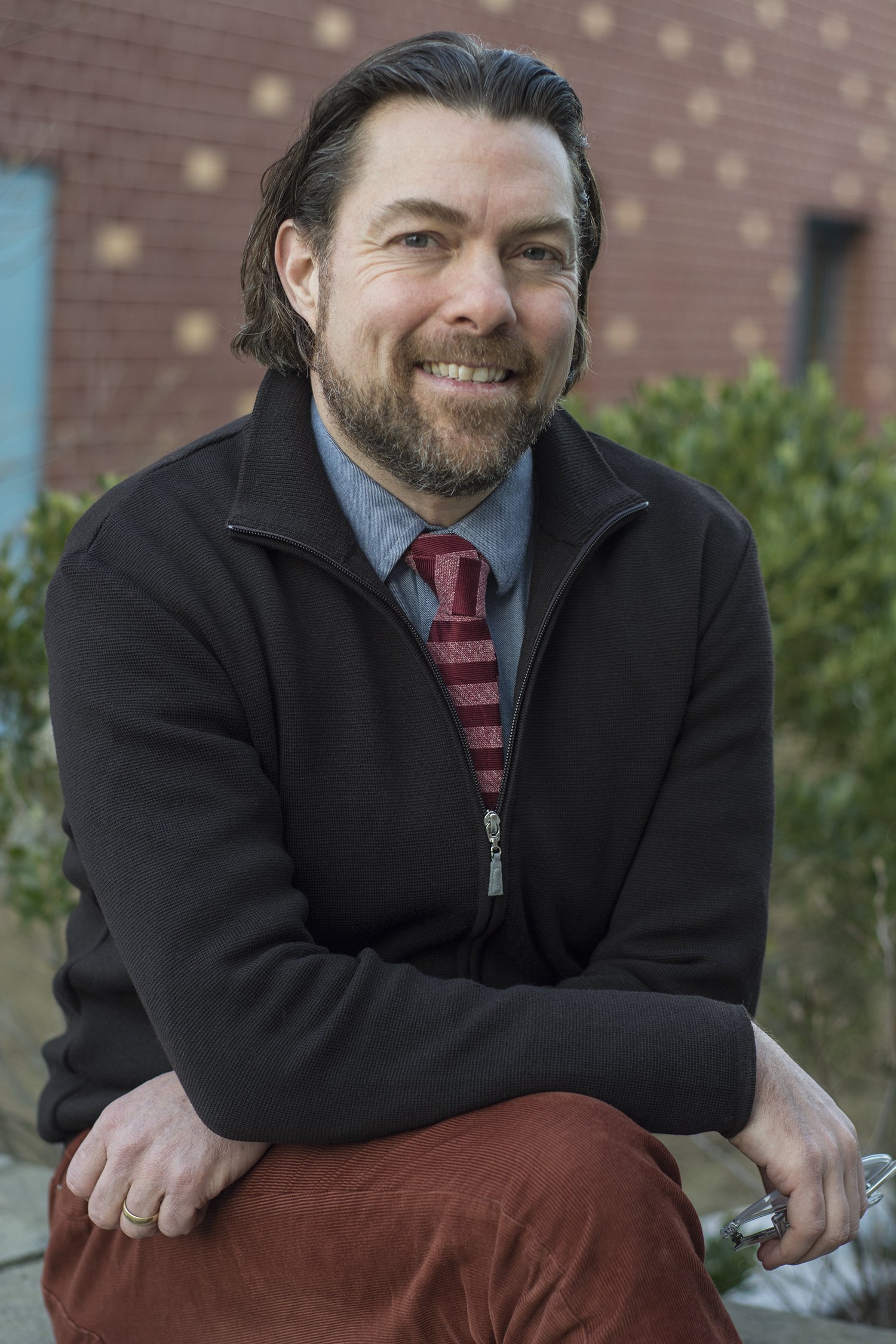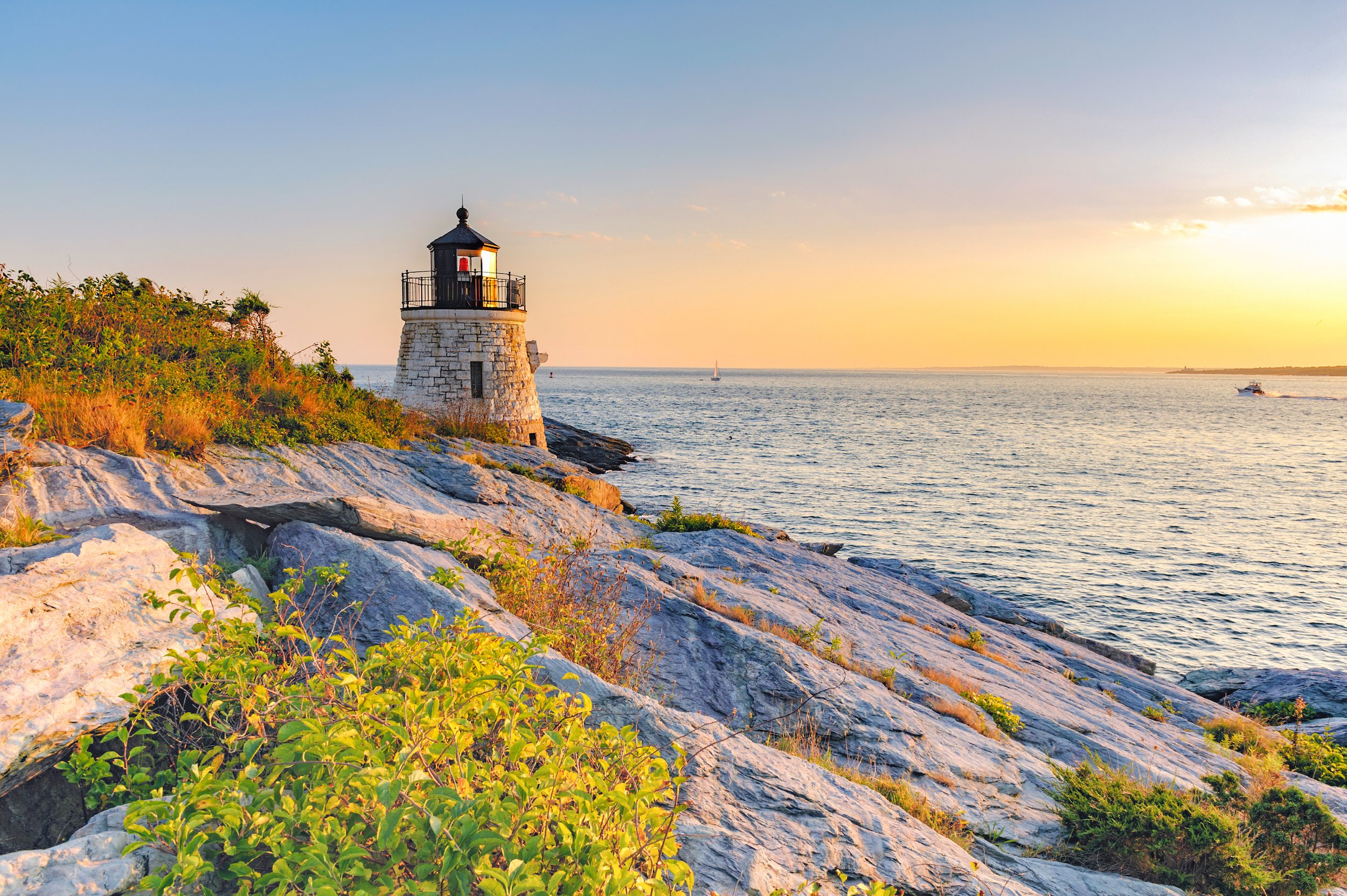
MEET THE NARRAGANSETT BAY TEAMS
Meet the Teams
Studio Brief: Recent reports show that New England is warming faster than almost any other region on the planet. The Fourth National Climate Assessment highlighted the challenges facing the Northeast region in saying, "Residents in urban areas face multiple climate hazards, including temperature extremes, episodes of poor air quality, recurrent waterfront and coastal flooding, and intense precipitation events that can lead to increased flooding on urban streams." To build with resilience in mind goes far beyond trying to hold the sea at bay, but how to reshape the built environment with both vision and care. With a focus on the area around Providence's Fox Point Hurricane Barrier, this class will grapple with the intersection of some of the most pressing issues around coastal cities, from technological challenges to environmental contamination to social equity.
Northeastern University School of Architecture
Sara Carr, Ph.D; Assistant Professor
Students: Noelle Burke, Bridget Fish, Xin (Gloria) Guo, Scarlett Hanks, Tessa Hocquet, Melissa Jacobs, Olivia Johnson, Chareese Lam, Nora Masler, Malav Mehta, Lena Parsch, Sophia Pinto, Hsiao-Chung (Daniel) Su, Ziai Zhou
Northeastern University School of Architecture final presentation to jury, April 26, 2022.
Sara Jensen Carr,
Assistant Professor, The School of Architecture at Northeastern University
Sara Jensen Carr is an assistant professor at The School of Architecture at Northeastern University. Her teaching and research focus on the connections between landscape, human health, urban ecology, and design. Her current book in progress, The Topography of Wellness: Health and the American Urban Landscape, examines landscape responses to six historical urban epidemics and the implication for current and future practice. Sara holds a Master of Architecture from Tulane University, and a Master of Landscape Architecture and PhD in Environmental Planning from University of California Berkeley, where she was the co-founding editor of the ASLA Award-winning GROUND UP Journal.
Studio Brief: In this studio, we approached the future of sea level rise in Warren, Rhode Island by looking at two scales simultaneously, the urban landscape scale and the building scale, with a goal of understanding not only how to do less harm, but how to build up in a way that has positive ecological impacts and reinforces the existing community.
At the landscape scale, we allowed the wetlands to reassert themselves and we envisioned a more dense and vital urban boulevard with a community performance center, new factories and housing in place of an underused commercial strip.
At the building scale, we designed zero-energy buildings using hemp lime construction, for its benefits as a durable, benign, insulating material. Hempline is a crop that can be grown locally using regenerative farming practices, which happens to also sequesters carbon. We explored its architectural potentials of solidness to achieve unexpected transitions that are carved, cut and layered to create beautiful spaces and surfaces.
Rhode Island School of Design, Department of Architecture
Anne Tate, Professor
Laura Briggs, Senior Critic
Students: Andrew Larsen, Andrew Rushing, Chae Yeon Woo, Hong Wei, Ioanna Athanasopoulou, Jiayi Cai, Mariesa Travers, Ruyue Qi, Taehun Ha, Tzu-Chun Hsu, Xuhan Zhao, Yingshan Lei, Ziyue Su. RA's Julia Woznicki, Chunxin Yu
RISD School of Architecture final presentation to jury, April 25, 2022.
A pioneer in sustainable planning for 25 years, Anne Tate teaches architecture and urban design at RISD and leads various sustainability initiatives on campus. In 2019-2020 she was the academic director of RISD’s European Honors Program in Rome. She represents RISD in a new Resilient Providence Partnership, with Brown University, URI and Waterfire. Anne has focussed on the intersection of design and policy and served in 2003–04 as special advisor on sustainable development in the Office for Commonwealth Development (OCD) in Massachusetts, where she led two signature efforts: The Sustainable Development Principles and the Transit Oriented Development Initiative. She is an advisor to the city of Somerville, MA and has led various community planning initiatives there.
Studio: Rethinking Green Urbanism
Anne Tate
Professor, Rhode Island School of Design (RISD), Architecture
Rhode Island School of Design, Department of Landscape Architecture
Elizabeth Dean Hermann, Ph.D; Professor of Urbanism and Landscape
Students: Xinyi Cai, MLA candidate; Jingjing Cui, MLA candidate; Jingyu Ge, MLA candidate; Alex Gonzalez, MLA candidate; Shijie Li, MLA candidate; Jinting Liu, MLA candidate; Ruiqing Miao, MLA candidate; Joyce Shen, MLA candidate; Hanna Wells, Brown University Urban Studies; Jieqi Yao, MLA candidate; Danfei Zhang, MLA candidate
Studio: "Radical Eversions" – Urban Systems Graduate Landscape Architecture Studio
This Landscape Architecture studio focuses on climate impacts at Providence’s industrialized waterfront and along the adjacent stretch of the I-95 corridor and considers this north-south running swath of the city in light of its legacy as a zone of inequity and environmental degradation.This core Landscape Architecture Urban Systems studio "RADICAL EVERSIONS" focuses on the frontline community of South Providence, the I-95 corridor and the city's industrial waterfront, an area of health inequities, food insecurity, land degradation and contamination that is directly threatened by rising sea levels. The studio asks: How threats can become opportunities; How barriers can become Commons; How scarcity can become abundance.
RISD Landscape Architecture presenting during Final Jury Review April 26, 2022.
Elizabeth Dean Hermann, Ph.D. is a cultural historian, designer and professor of Urbanism and Landscape at RISD whose research and teaching focus on cities, their culture-environment interconnectivity, gender issues and at-risk communities. For the past several decades her work has been centered in South Asia and the coastal cities of the Bay of Bengal region where climate change impacts are compounded by rapid urbanization due to rural to urban migration, conflict or environmentally-driven displacement, and competing land interests. Hermann received her PhD from Harvard where she focused on urban history and pandemic disease in the pre-modern Muslim world. She has taught at MIT, Harvard, Brown and Washington University in St. Louis. She has been Social Innovator-in-Residence and a visiting scholar in Babson College's Social Innovation Lab and Entrepreneurship Program; a SPURS Fellow in Urban Studies and Planning at MIT; a senior Fulbright Fellow in Sri Lanka; a Fellow of the American Academy in Rome; and is a Professional Fellow in Economic Empowerment with the U.S. State Department. Hermann is founder and co-director of TAASI East, an international independent non-profit applied research lab working with partners in Sri Lanka and elsewhere on issues of social and environmental justice, community development and climate change impacts. Hermann is currently completing two book projects: "Cities of Silt and Sand: The Bay of Bengal and its Narrative of Displacement, Urbanization and Struggle" and "Widening Waters: Landscape, Identity and Narrative in Sri Lanka"; all while planning a 277-mile north-south walk and sectional mapping effort – The Lanka Transect – as part of her writing and artwork series PieceWorks/PeaceWorks which focuses on Sri Lanka’s religious, ethnic, and cultural diversity alongside the non-human natural conditions that transcend human divisions and whose innumerable threads weave the very foundation and fiber of this small island.
Elizabeth Dean Hermann (Lili), Professor, Urbanism and Landscape
Rhode Island School of Design (RISD), Department of Landscape Architecture
Bryce DuBois
Assistant Professor, Rhode Island School of Design (RISD), History, Philosophy, and the Social Sciences (HPSS)
Bryce DuBois is an assistant professor at RISD. He is an environmental psychologist who draws from fields of psychology, geography, anthropology and natural resources in order to contribute to a better understanding of complex environmental conflicts and to support community-level responses. Most of his work is focused on urban coastal areas of New York City and, more recently, southeast New England. His dissertation, Beaches, People and Change, was an ethnographic work focused on the restoration of NYC’s Rockaway Beach after Hurricane Sandy and the related conflicts over inequities in resource distribution. DuBois has contributed to several journal articles, book chapters and research reports related to environmental education, environmental stewardship, community gardens, social-ecological resilience and ethnographies of parks.
Studio: Rethinking Green Urbanism
Roger Williams University, School of Architecture, Art & Historic Planning, Graduate Architecture Program
Ryan Ludwig, Assistant Professor
Students: Alex Bleiweis, Olivia Cromer, Laura Griffin, Caleb Hayward, Brianna Jordan, Joseph Larue, Rob Rice, Josh Shaw, Kyle Sheehan, Noah Vasquez, Josue Vides-Erazo
Studio: This graduate-level Collaborative Revitalization Studio brings together architecture and historic preservation students to develop a series of tactical strategies and design proposals aimed at the issue of local food sovereignty, community education, and landscape restoration/preservation on Aquidneck Island. The research and design efforts of this graduate Collaborative Revitalization Design studio bring together architecture and historic preservation students to consider questions of preserving, restoring and fostering a more resilient Aquidneck Island agricultural landscape and community-oriented food system on the island. Leveraging the historic Prescott Farm’s (ca.1650) prominence as a preservation site containing a collection of historical structures and extensive land holdings, the farm’s role in the community will be amplified and expanded, through the work of the non-profit organization Aquidneck Community Table, to become a new community focused food hub, regional weekly farmer’s market and regenerative agricultural education center.
In essence, the aim of the studio is to think holistically about coastal resilience for Aquidneck Island and what it means to consider more than just mitigation and adaptation measures, but also other fundamental systems for resilient living – like food access and security – on an island in a time of rapid change and future instability.
Roger Williams University team presenting to Jury on April 26, 2022.
Ryan Ludwig
Assistant Professor, Roger Williams University, School of Architecture, Art & Historic Preservation
Ryan Ludwig is an NCARB certified licensed Architect, educator and writer. He is an Assistant Professor of Architecture at Roger Williams University and has previously held teaching positions at Syracuse SoA, SUNY Buffalo a+p and Cornell AAP. He currently maintains his own design research practice: Ludwig-ArchOffice (L-AO). His professional and academic research are focused on the intersection of architecture, ecology and social equity in the built environment through the exploration of alternative design approaches capable of engendering co-productive relations between them. In 2018 Ludwig received a prestigious MacDowell fellowship during which he focused on writing the book "Beyond Sustainable: Architecture’s Evolving Environments of Habitation" published by Routledge (2021). The book reconceptualizes the relationship between human beings and the constructed environments of habitation they create living in the Anthropocene and challenges how we might cope and adapt to ongoing changes in the earth-system. Ludwig was also a co-editor of the book "The Function of Form" by Farshid Moussavi, published by Actar Press (2009/2020).
As an active member of The-Architecture-Lobby (TAL) Ludwig is currently a co-coordinator of the TAL Green New Deal Working Group which focuses on organizing for liberatory principals and ecological justice as they relate to architectural labor, the built environment, and sustainable futures for all. His work has been supported by an Art Omi: Architecture Residency Fellowship (2021), Centrum Artist Residency (2018), DAAP Faculty Development Grant (2020 & 2021), the Pogue Wheeler DAAP Faculty Travelling Fellowship (2021) and he was an Enterprise, Rose Architectural Fellowship Finalist (2016). Ludwig holds a professional Bachelor’s degree from Cornell AAP (’04) and a post-professional Master’s degree from the Harvard Graduate School of Design (’09).
Julia Wyman
Director of the Marine Affairs Institute & Director of the Rhode Island Sea Grant Legal Program, Roger Williams University School of Law
Julia Wyman is the Director of the Marine Affairs Institute and the Director of the Rhode Island Sea Grant Legal Program. Ms. Wyman has extensive state and national ocean and coastal law and policy experience. Previous positions Ms. Wyman has held include: Ocean and Environmental Counsel for Sen. Sheldon Whitehouse (D-RI); staff attorney at the Marine Affairs Institute; and the policy analyst for the Coastal States Organization in Washington, D.C., an organization that represents the interests of the governors of the thirty-five coastal states, commonwealths, and territories.
Much of Ms. Wyman’s work has focused on coastal adaptation to climate change. She serves as an adjunct faculty member at RWU School of Law, where she teaches courses related to ocean and coastal law and policy, including Climate Change Law and Policy, Ocean Management Law and Policy, and Environmental Justice.
Studio: Two Rhode Island Sea Grant Law Fellows, second and third year law students, will help identify law and policy challenges to proposals in Barrington, Bristol and Warren. The Law Fellows will examine what necessary law and policy changes are needed for successful adaptation.
This informational memorandum is a product of the Marine Affairs Institute at Roger Williams University School of Law and the Rhode Island Sea Grant Legal Program. Christopher Perrett, Rhode Island Sea Grant Law Fellow, provided research and drafting of this study under the guidance of Lauren Beagen, Research Attorney. All errors and omissions are the responsibility of the Marine Affairs Institute. This study is provided only for informational and educational purposes and is not legal advice.
This project was completed as part of the Envision Resilience Narragansett Bay Challenge. The Envision Resilience Challenge model, a coastal resilience initiative that connects academia, local leadership and community members, first launched in the spring of 2021 as the Envision Resilience Nantucket Challenge, with the goal of inspiring coastal communities to envision innovative adaptations to sea level rise. For the Narragansett Bay Challenge, The Marine Affairs Institute worked in conjunction with the University of Rhode Island team to identify opportunities to utilize coastal overlays as a coastal resilience tool in Bristol County, Rhode Island.
Syracuse University School of Architecture
Julia Czerniak, Professor & Associate Dean Ted Brown, Professor
Students: Ayana Ayscue, Khoi Nguyen Chu, Clara Faure-Dauphin , Kaylee Holmes, Ruoxi Li, Zhi Fei Li, Raquel Rojas, Troy Schleich, Ruth Shiferaw, Zhuofan Song, Tony Fitzgerald, Parker Vanderven, Yifei Xia, Muge Zhang
Studio Brief: IF, THEN: Within the context of the Narragansett Bay watershed, the studio focuses on the town of Warren and the village of Wickford, two historic coastal communities in Rhode Island. Through researching moments of natural and cultural adaptation through time and across scale, traveling to the sites for ground truthing and meeting with local experts and residents, we test a set of design scenarios for these communities to adapt to the challenges of climate change and be resilient to future changes through the lens of architecture. In this context we investigate what it might mean to RETREAT & ADAPT (that is, by literally moving settlement to higher ground and proposing novel ways of living that is more climate friendly); EMBRACE & ENGAGE (through remaking shorelines to participate with rising waters and open them up to common use by human and non-human species); or PROTECT & ABSORB (through innovative ways of preserving invaluable resources).
Syracuse University School of Architecture presenting to Jury on April 26, 2022.
Theodore Brown
AIA, FAAR ‘88 Professor, School of Architecture at Syracuse University Fellow, Gray Center for Arts and Inquiry, The University of Chicago, Munly Brown Studio + Studio R-An
Ted Brown is a professor in the School of Architecture, Syracuse University where he has served as the graduate and undergraduate chair, and as director of the Florence programs. Brown’s collaborative design practices work within the public and private sectors addressing architecture and the city at the infrastructural, neighborhood and apparatus scales. He is a founding partner of Munly/Brown Studio, with projects that include mix-use housing, the master plan for the Salt District Neighborhood and the Childcare Campus and Catholic Chapel for Syracuse University. In collaboration with the landscape practice Julia Czerniak/CLEAR, Brown has worked on local waterfront redevelopment projects for the city of Syracuse. His work in the visual arts has ranged from “Landscape Miniatures” to mixed media stain paintings. His research includes the visualization of archeological evidence under the Basilica of San Marco, Venice in relation to early settlement patterns and sea level rise. Brown’s recent research examines ways to link the art of assembly as a material practice with assemblage theory. The forum for this work is Studio R-A (Ted Brown/Bill Brown) resulting in articles and design provocations on/of re-assemblage. “Siting re-assemblage” re-imagines landscape as an assemblage practice in the context of assemblage thinking in the visual arts, social theory and urban geography.
Brown received a Master of Architecture degree from Princeton University and a Bachelor of Science in Architecture from the University of Virginia. Prior to joining the faculty at Syracuse Architecture, he taught at Princeton University and the Oregon School of Design. In 1987 he received the Rome Prize in Architecture and conducted research on early representations of the city. He is a Fellow of the Gray Center for Arts and Inquiry at the University of Chicago where he was resident in 2018.
Julia Czerniak
Professor and Associate Dean, Syracuse Architecture, Creative Director, CLEAR, RLA, ASLA
Julia Czerniak is associate dean and professor of architecture at Syracuse University where she teaches studios as well as seminars on landscape theory and criticism. Czerniak is educated both as an architect and landscape architect and her research and practice draw on the intersection of these disciplines. Although the techniques, scales and products of her research vary, Czerniak’s work focuses on the physical and cultural potentials of urban landscapes. Recent design research advances landscape as a protagonist in the remaking of Rust-Belt cities, from a series of public space interventions along a derelict creek to ecologically and spatially rich streetscapes for a newly planned campus of Syracuse University.
Czerniak’s work as a designer is complemented by her work as educator and writer, which in all cases advances design as both a way to enable new ways of seeing, imagining, valuing and acting within our challenged anthropocentric environment and the agent of a socially and ecologically rich public realm. Large Parks (Princeton Architectural Press) and Case: Downsview Park Toronto (Prestel) focus on contemporary design approaches to public parks and the relationship between landscape and cities. Formerly Urban: Projecting Rust Belt Futures (Princeton Architectural Press) examines potential futures for shrinking cities. Other writings include essays in Third Coast Atlas (Actar); Wiley-Blackwell Companion to the History of Architecture (Wiley & Sons); Landscape Infrastructure (Birkhauser); Landscape Alchemy: The Work of Hargreaves Associates (ORO Editions); Fertilizers: Olin Eisenman (Institute for Contemporary Art,); Landscape Urbanism (Princeton Architectural Press); Assemblage 34 (MIT Press) and Harvard Design Magazine. Czerniak lectures and teaches internationally, most recently delivering keynote lectures at the Onassis Foundation in Athens, the Large Parks in Large Cities conference in Stockholm, the Open Space Summit in Brussels and the Australian Institute of Landscape Architects annual conference.
University of Florida Historic Preservation Program
Linda Stevenson, Ph.D., AIA, Adjunct Assistant Professor
Cleary Larkin, Ph.D., RA, Interim Director, Historic Preservation Program
Students: Tess Flemma, Hisham Khafaji, Emma Ramseyer, Rae Shropshire, Tyler Smith, Craig Steckelberg
Studio Brief: The neighborhood of Washington Park possesses a rich inventory of tangible and cultural heritage assets, but is suffering from economic decline and has lost the traditional connection to the waterfront. While not directly threatened by sea level rise, the community could become a refuge for those escaping the low-lying coastal areas around Narragansett Bay. Without a vision for the future the community will face further threats from over-development and gentrification, resulting in the loss of a unique, affordable urban neighborhood. This study proposes to leverage the heritage assets to improve resiliency for both the immediate community and the surrounding area, and to ensure a more equitable future for its residents.
University of Florida Historic Preservation presenting to Jury on April 25, 2022.
Linda Stevenson, PhD, AIA
Adjunct Assistant Professor, University of Florida, Historic Preservation
Linda Stevenson, PhD, AIA, is an Adjunct Assistant Professor in the Historic Preservation Program at the University of Florida. As an architect with over thirty years of experience in preserving, interpreting and revitalizing historic places, she is passionate about engaging with the next generation of preservationists. Her research program focuses on conserving and interpreting both material and intangible heritage, community engagement, and creatively communicating place significance through innovative technologies. Her experience with heritage-based resiliency projects includes an ongoing study of mid-century historic resources in flood hazard areas for Pinellas County, Florida, and teaching in the Preservation Institute Nantucket program. Linda holds a Master of Architecture degree from the University of South Florida, and a PhD with a concentration in Historic Preservation from the University of Florida.
Cynthia Barnett
Environmental Journalist in Residence, College of Journalism and Communications
Cynthia Barnett is an award-winning environmental author and journalist who has reported on water and climate change around the world. Her latest book, The Sound of the Sea: Seashells and the Fate of the Oceans, was recently named one of the best science books of 2021 by NPR’s Science Friday. Cynthia serves as Environmental Journalist in Residence at the University of Florida’s College of Journalism and Communications, where she leads student field reporting on water and climate change; trains PhD students in scientific storytelling and leadership; and works on climate communications from the perspectives of community outreach and journalist training. Cynthia’s classes include Environmental Journalism; Viral Rhetoric; and Science, Narrative and the Greater Good.
Cynthia is also author of the water books Mirage; Blue Revolution; and Rain: A Natural and Cultural History, long-listed for the National Book Award and a finalist for the PEN/E.O. Wilson Award for Literary Science Writing. She has written for National Geographic magazine, the New York Times, Los Angeles Times, Wall Street Journal, the Atlantic, Discover magazine, Salon, Politico, Orion, and many other publications.
University of Florida, School of Architecture
Jeff Carney, Associate Professor
Students: Brian Murtagh, Daniel Wellhausen, Victoria Hardison, Kyle O'Quinn, Zach Mengel, Alex Roman, Brian Lachnicht, Daniel Rivero-Gonzalez, Rachel Ruscigno, Valentina Galbusera, Nicholas Londono, Ibiebeleme Opuso-Jama, Jin Deng, Alexia Gomez Emard, Harrison Ryan, Anthony Espinosa
Studio Brief: D8 is the final studio in the undergraduate curriculum at the University of Florida and is designed to give students the opportunity to apply their skills to a complex design challenge. Around the world, slow inundation from sea level rise and greater destruction caused by storms are forcing coastal populations to migrate inland and upland. As millions of people face this threat over the next half century, can we imagine accommodating such change through typical processes of housing and community development? Will such adaptation require a radical new approach to the architecture of human settlement? Working with a coastal site in Barrington, Rhode Island, the 7.2-acre hilltop site of a former monastery, the project proposes redevelopment to accommodate people locally displaced by sea level rise and storm. Read the Envision Resilience: Barrington Refuge studio report here.
University of Florida School of Architecture presenting to final jury on April 25, 2022.
Jeff Carney
Associate Professor, FIBER Director, University of Florida
Jeff Carney is associate professor in the School of Architecture and director of the Florida Institute for Built Environment Resilience (FIBER). He is a registered architect and certified urban planner working at the interface of housing, neighborhoods and ecosystems, with a focus on climate change adaptation. Jeff’s work in Florida is focused on the resilience of communities achieved through transdisciplinary and community engaged design processes. Current projects include a HUD funded effort to design post-disaster modular housing, and projects to assist the Cities of Port St. Joe and Jacksonville reduce flood risk and balance health, environment, and housing needs.
Previously, Jeff was the director of the LSU Coastal Sustainability Studio where he led the development of the Louisiana Resiliency Assistance Program (LRAP) that continues to assist communities throughout Louisiana; additionally, he led the design and fabrication of the 10,000sf permanent exhibition for the LSU Center for River Studies called “shifting Foundations” which told the story of coastal Louisiana’s changing landscape. He co-directed his team’s award-winning submission for the Changing Course competition entitled “The Giving Delta”. Shortly before moving to UF, Jeff initiated the project “Inland from the Coast,” supported by the Gulf Research Program of the National Academies of Sciences and the Robert Wood Johnson Foundation.
Jeff’s projects have been recognized through awards including the 2018 AIABR Rose Award winner for the Shifting Foundations exhibit; the 2016 New York Chapter of the American Society of Landscape Architects Merit Award, for “The Giving Delta”; the 2014 APA Planning Excellence Award for Education, for the Louisiana Resilience Assistance Program; the 2012 ACSA Collaborative Practice Award, for the Coastal Sustainability Studio; and the 2011 EDRA Great Places Awards in Design Research for “Measured Change: Tracking Transformations on Bayou Lafourche.”
University of Rhode Island, Department of Landscape Architecture
Richard Sheridan, Professor, Chair
Dennis Staton, Visiting Practitioner
Students: Rosa Adimari, Roger Bissonnette, Michael Bono, Sean Bridges, Joe Colucci, Jason Glynn, Rony Gutierrez, Alex Henderson, Reed Johnson, Julia Kaplin, Zach Nardone, Brooke Pariseau, Maeve Rothschild, Gregory Sanford, Paige Shepard, Elly Soares, Nelson Vargas
Studio Brief: LAR 445 is a senior landscape architecture capstone studio at the University of Rhode Island. In spring 2022 this class will study and address these issues and their impact on the working waterfront in Warren, RI. They will analyze existing conditions such as land use, natural systems and cultural relevance. The goal is for the students to use their analysis as well as other research material to develop and present targeted designs/plans and illustrations that are optimistic, realistic and offer a new future to the Warren waterfront. The spring 2022 URI landscape architecture capstone class was given the task of mitigating the effects of sea level rise and storm surge on Water Street in Warren, a thriving yet threatened area. The challenge was to maintain its economic viability, honor its history and culture while at the same time recommending changes that would disrupt the status quo. Instead of big design gestures, this class treated the street as a jewel box, by designing detailed inlets and marshes using natural systems to protect the community, its values and its infrastructure, including buildings, roads and parking.
University of Rhode Island Landscape Architecture presenting to jury April 25, 2022.
Richard Sheridan
Professor and Chair, University of Rhode Island, Landscape Architecture Department
Richard Sheridan, ASLA, has more than 45 years of professional landscape architecture practice and teaching experience. He has practiced in the New York State Department of Transportation and throughout New England in his own firm. He has taught graduate and undergraduate design courses at the University of Arkansas, Ball State University and Norwich University. He is currently the chair of the Landscape Architecture department at the University of Rhode Island, where one of his favorite responsibilities is teaching senior capstone studio, funded by RI Sea Grant. To the benefit of his students, this capstone has collaborated with multiple agencies such as RI Coastal Resources Management Council, URI Coastal Resources Center, Save the Bay, and RI Department of Environmental Management. Richard’s current focus is on outreach and research using the “power of nature” to help communities with global issues such as, climate change and sea level rise adaptation, coastal and estuary environmental protection, integration of sustainable practices, and inclusion of cultural and ethnic values. He has presented his research on these topics at international venues in Berlin, Budapest, Istanbul and Guelph. Richard earned his MRP at the University of Massachusetts and received his BLA at the University of Georgia.
University of Rhode Island, Department of Landscape Architecture
URI Multidisciplinary Cohort
Austin Becker, PhD
Associate Professor and Chair of the Department of Marine Affairs at the University of Rhode Island
Dr. Austin Becker is Associate Professor and Chair of the Department of Marine Affairs at the University of Rhode Island. As an interdisciplinary scientist, he works across the fields of planning, policy, engineering, and ocean science. He creates and tests tools that help decision makers engage with complex problems involving uncertainty, consequences of natural hazards and large-scale shifts in climate, and the resulting challenges in policy and planning. This includes communicating storm impacts to emergency managers; perceptions of climate change amongst port administrators (globally); impacts of hurricanes on port communities; barriers to resilience investing at northeast ports; and vulnerability assessments undertaken by US ports. He has received funding from DHS, USACE, DOD, Dept. of Transportation and has worked directly with numerous industry groups.
Dr. Becker serves as Associate Editor for the Journal of Maritime Policy and Management and co-editor of the book Climate Change Adaptation Planning for Ports. He serves as an expert member of the United Nations Expert Group on Climate Adaptation for Transport. In 2020, he was appointed as Visiting Fellow at the US Naval War College, where he undertakes research on hazard impacts to Naval Station Newport and the surrounding municipalities. Dr. Becker has over 50 peer-reviewed publications and in 2017 was awarded the prestigious Sloan Foundation Research Fellowship in Ocean Sciences. He earned a PhD in Environment and Resources at Stanford University and maintains a 500 Ton USCG Captain’s License.
Yuwen Chen
Associate Professor, University of Rhode Island, College of Business
Dr. Yuwen Chen is an associate professor of Supply Chain and Operations Management at the University of Rhode Island. He has been with the University of Rhode Island for 13 years and has been involved in MBA teaching and capstone project coaching for 9 years. Dr. Chen is also a certified Six Sigma Blackbelt and teaches Lean Six Sigma techniques in the MBA program. His research interests include Supply Chain and Operations Management, New Product Development, Supply Chain collaboration and Competition, Information System, and Business Education. His teaching portfolio include Supply Chain and Operations Management, Transportation, Capstone Projects, Lean Six Sigma, Data Visualization in Tableau, and Supply Chain Analytics and Data Mining.
Executive Summary of URI MBA student team's work on Climate Resilience Project in the case of Warren Water Street district.
Teresa A. Crean, AICP
Coastal Community Planner
University of Rhode Island, RI Sea Grant
Teresa Crean is a community planner and coastal management extension specialist with the Coastal Resources Center (CRC) and Rhode Island Sea Grant at the University of Rhode Island’s Graduate School of Oceanography. Teresa joined CRC/Sea Grant in 2008 and is currently facilitating municipal-scale projects in Rhode Island that address coastal adaptation to climate change and sea level rise. This work involves evaluating the results of mapping exercises to clearly communicate challenges and opportunities to municipal stakeholders while collaboratively considering policies and projects that may increase resiliency in the face of potential impacts from coastal hazards and storm events. Teresa has also has worked on renewable energy planning, marine spatial planning and coastal community planning, addressing public access and working waterfront issues. All of her work employs a research and planning process that integrates the best available science with open input and involvement from a broad range of stakeholders, decision makers and the public. Teresa also has worked for non-profit regional planning commissions and for planning/design firms in the private sector. She earned a Master of Landscape Architecture (M.L.A.) from the SUNY College of Environmental Science and Forestry at Syracuse, a B.S. in Environmental Policy/Natural Resource Management from the University of Michigan and is a certified planner through the American Institute of Certified Planners (AICP).
"About" Your Studio:
University of Rhode Island senior undergraduates will collaborate through the Integrated Coastal Resilience Capstone project that brings together URI Ocean Engineering, Landscape Architecture, Marine Affairs, and Environmental and Natural Resource Economics to address broad issues impacting Bristol County, and issues specific to the Water Street corridor in Warren, RI. URI MBA students in the College of Business will consider supply chain concerns with the exposed transportation network throughout Bristol County.
Emi Uchida
Professor, University of Rhode Island, Environmental and Natural Resource Economics
Emi Uchida’s research seeks to advance sustainability science by uncovering the complex dynamics between poverty and natural resources, with a focus on examining how policies, market-based solutions and other incentives contribute to environmental sustainability and poverty reduction. She has conducted research in Asia, Africa and the U.S., utilizing original household surveys, field experiments, spatial data and applied econometrics. Emi has led large interdisciplinary research teams to study ecosystem services from rural and urban landscapes, forests, and coastal ecosystems, with the goal of supporting stakeholders to make more informed, science-based decisions.
PRELIMINARY RESULTS: COMMUNITY PERCEPTIONS OF COASTAL RISKS IN WARREN, RI:
Project Brief of URI's Environmental Economics and Policy students' work of a community survey on perceptions on climate change in Warren, RI.
Disclaimer: This brief is based on preliminary results as it is based on an on-going survey. Please do not quote or cite--check back for updates.









